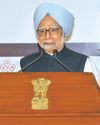When prime minister Narasimha Rao handpicked Manmohan Singh as finance minister in 1991, it was an audacious gamble. Here was a technocrat—soft-spoken, unassuming and seemingly ill-suited to the cut-throat world of politics. But Rao's instincts were correct. Facing a near-catastrophic balance-of-payments crisis, Singh unlocked India with reforms, dismantled decades-old red tape and gave wings to the nation's entrepreneurial spirit. His economic liberalization laid the foundation for modern India, his diplomacy expanded its global influence, and his integrity inspired trust in public life.
His 1991 Budget speech is now the stuff of legend: "No power on Earth can stop an idea whose time has come." These words, delivered in his trademark monotone, masked the monumental shift they heralded. Singh's reforms opened India to global markets, attracting investments, boosting industries, and laying the groundwork for the IT revolution. Millions were lifted out of poverty, and India's GDP growth began its ascent to global prominence.
An economist of rare brilliance, a statesman of unshakable integrity, and a man of quiet yet unyielding resolve, Singh leaves behind a legacy that defies the noisy rhetoric of politics. His life story—one of humble beginnings, transformative achievements, and steadfast principles—mirrors the aspirations of a modern, self-assured India.
Coalition government
Esta historia es de la edición December 28, 2024 de Mint Mumbai.
Comience su prueba gratuita de Magzter GOLD de 7 días para acceder a miles de historias premium seleccionadas y a más de 9,000 revistas y periódicos.
Ya eres suscriptor ? Conectar
Esta historia es de la edición December 28, 2024 de Mint Mumbai.
Comience su prueba gratuita de Magzter GOLD de 7 días para acceder a miles de historias premium seleccionadas y a más de 9,000 revistas y periódicos.
Ya eres suscriptor? Conectar

Cash heap spurs call for buybacks and dividends
A bunch of top companies is hanging on to almost ₹1 trillion of free cash that it has yet to find a use for, according to an analysis done by a proxy advisory firm.

Syria looks to pick up the pieces of its shattered economy
The country of more than 20 million people are understaffed and short on experience, having governed only a single province before finding themselves in charge.

Crafting Bharat: Deep-tech edition-with Fermbox Bio, at the forefront of precision fermentation
India's bioeconomy has witnessed phenomenal growth, surging from US$10 billion in 2014 to over US$130 billion in 2024.

Advertisement DR MANMOHAN SINGH REFORMS WITH A HUMAN FACE
The Prime Minister walked towards me, his grace and purpose.

Rajat Verma to take over as DBS Bank India CEO
Singapore-based DBS Bank has appointed Rajat Verma as the officer of the chief executive officer of DBS Bank India with effect from 1 March, the bank said in a release.
Two aeroplane crashes lead to deadliest year in skies since 2018
Passenger fatalities jump to 318 this year
Senores Pharma has a strong debut
The shares of Senores Pharmaceuticals Ltd on Monday listed with a premium of over 53% against the issue price of ₹391.

Senores Pharma has a strong debut
Securities and Exchange Board of India (Sebi) has cleared proposals of six companies, including Leela Palace parent firm Schloss Bangalore, Ather Energy and Oswal Pumps, to launch their public issues.

15 Awesome Stories You Shouldn't Miss
In 2024, we published over 200 Long Stories. Here's our recommended year-end list
Should NRIs deduct TDS on property sale?
Under India's income tax laws, any individual buying an immovable property (excluding agricultural land) from a resident seller must deduct TDS at 1% of the total consideration if the purchase price or stamp duty value is ₹50 lakh or more. The TDS is calculated on the higher of two values, not just the amount exceeding ₹50 lakh. This applies equally to both resident and non-resident buyers.